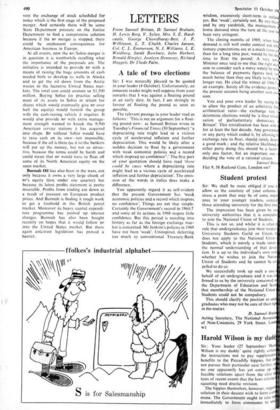LETTERS
From Samuel Brittan, D. Samuel Braham, H. Lewis Berg, V. SyIles, Mrs. S. E. Hard- castle, George Chowdharay-Best, J. F. Wilkinson, L. T. Chubb, Charles Janson, Col. C. L. Emmerson, N. J. Williams, L. E. Weidberg, Sarah Rowbury, John Herbert, Ronald Hingley, lossleyn Hennessy, Richard Huggett, Dr Thede Palm.
A tale of two elections
Sir: I was naturally pleased to be quoted in your leader (4 October). Unfortunately, an innocent reader might well suppose from your remarks that I was against a floating pound at an early date. In fact, I am strongly in favour of floating the pound as soon as possible.
The relevant passage in your leader read as follows: 'This is not an argument for a float- ing pound now : as Samuel Brittan wrote in Tuesday's Financial Times (30 September) "a depreciating rate might lead to a vicious cycle of accelerated inflation and further depreciation. This would be likely after a sudden decision to float by a government with weak economic policies and a record which inspired no confidence".' The first part of your quotation should have read 'there could be cases where a depreciating rate might lead to a vicious cycle of accelerated inflation and further depreciation'. The omis- sion of the words in italics does make a difference.
You apparently regard it as self-evident that the present Government has 'weak economic policies and a record which inspires no confidence'. Things are not that simple. Certainly the Government's record in 1964-7 and some of its actions in 1968 inspire little confidence. But this period is receding into history as far as the foreign exchange mar- ket is concerned. Mr Jenkins's policies in 1969 have not been 'weak'. Uninspired, deferring too much to conventional Treasury-Bank wisdom, excessively short-term in outl yes. But 'weak', certainly not. By any theo and by any yardstick, the management home demand since the turn of the year h been very stringent.
The closing months of 1969, when ho demand is still well under control and infi tionary expectations are at a much lower eb than for a long time past, would be the ide time to float the pound. A very sen Minister once said to me that the right occ sion to consider such a move would be wh the balance of payments figures look ye much better than they are likely to be in t longer run. He cited the winter of 1966-7 an example. Surely all the evidence points the present autumn being another such oce sion.
You end your own leader by saying th to allow the product of an arbitrarily fix arithmetical ratio—the exchange rate— determine elections would be 'a final trivial sation of parliamentary democracy Britain'. This trivialisation has been with for at least the last decade. Any governme or any party which ended it, by allowing t exchange rate to float, should surely dese a good mark ; and the relative likelihood either party doing this should be a factor only one factor, but an important one— deciding the vote of a rational citizen.
Samuel BM: Flat 9, 58 Rutland Gate, London sw7










































 Previous page
Previous page